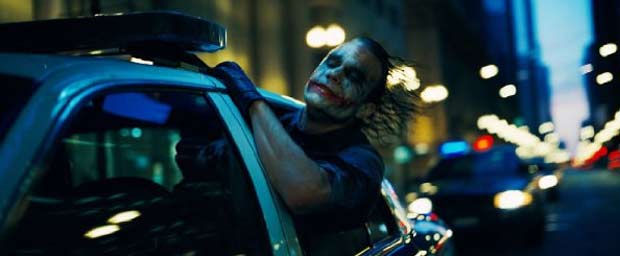
While commenters had a field day with my admittedly rambling post describing the troubling pro-Bush Administration subtext in Batman: The Dark Knight, there have been a few heavyweight additions to the fight over the last few days. First of all, the Wall Street Journal published an op-ed piece on Friday called “What Bush and Batman Have in Common” which looks at things from, well, the dark side:
There seems to me no question that the Batman film “The Dark Knight,” currently breaking every box office record in history, is at some level a paean of praise to the fortitude and moral courage that has been shown by George W. Bush in this time of terror and war. Like W, Batman is vilified and despised for confronting terrorists in the only terms they understand. Like W, Batman sometimes has to push the boundaries of civil rights to deal with an emergency, certain that he will re-establish those boundaries when the emergency is past. … When heroes arise who take those difficult duties on themselves, it is tempting for the rest of us to turn our backs on them, to vilify them in order to protect our own appearance of righteousness. We prosecute and execrate the violent soldier or the cruel interrogator in order to parade ourselves as paragons of the peaceful values they preserve.
While I found The Dark Knight‘s simplistic implications deeply troubling, they make Mr. Klavan want to touch himself. I guess churning out piles of 3rd-rate mysteries and Christian adventure stories, you may start to see things a little differently.
On the other side of the Atlantic, UK Guardian writer David Cox does what I couldn’t, connecting The Dark Knight‘s sloppy neocon message to its failure as a film, saying that its ambitious subject matter could have made it “a fable for our times”:
Unfortunately, the potential elements of any such message are lost in a welter of Hollywood clichés that may or may not be relevant. Thus, the Joker’s nihilism turns out to have less to do with Bin-Laden’s boringly purposeful agenda than with the gothic playfulness of the traditional movie mega-villain. Naturally, weaker players in the good guys’ teams are turned by the enemy. After all, that’s what happens in the movies, whether or not it does in the war on terror. … Hang on, you may say. We’re talking allegory here, not dramadoc. No need to get too literal about all this. Yet the confusion matters. It provides a smokescreen behind which the task of weaving all of those casual allusions into some kind of coherent whole can be persistently ducked.
Like I said, looking at gigantic projections of nighttime cityscapes is always neat, but the more I think about it, the less happy I am that I gave these people my $17. And it’s not like they need it: The Dark Knight is on track to become the biggest-grossing film of all time. Kind of makes 1997 seem like a million years ago, doesn’t it.















